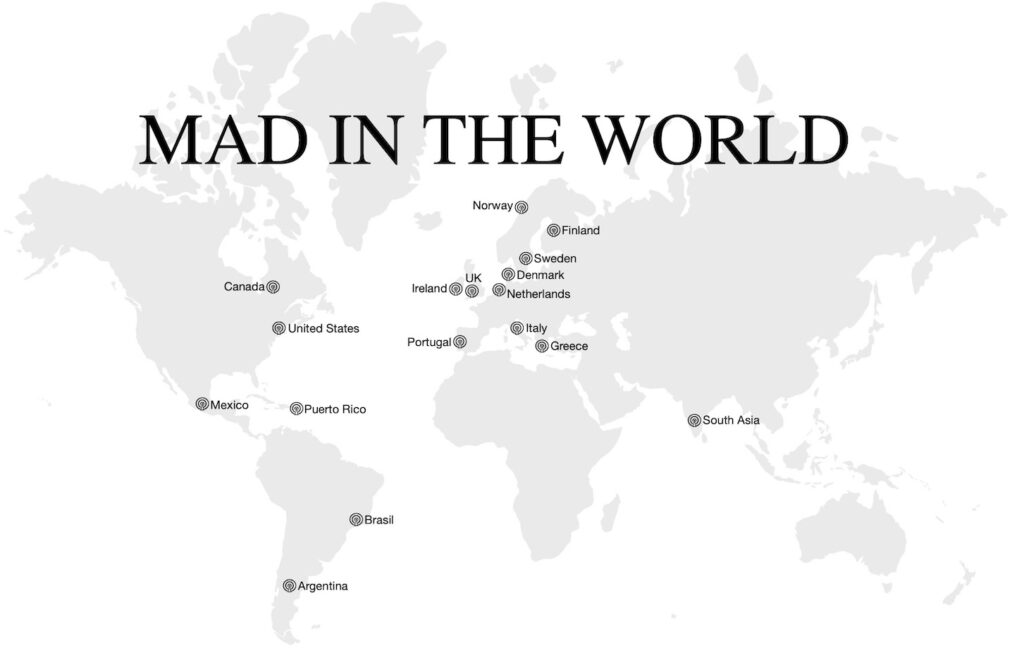Marnie Wedlake, co-editor of Mad in Canada, sees four distinct agendas driving her country’s vast, overtaxed, publicly funded healthcare system.

The first is professional. The second is political. The third is corporate. And the fourth—“last in line behind the soup pot” —is effective patient care, putting what should be everyone’s foremost concern smack at the bottom of the list.
For mental-health service users, this means they’re fed the standard line: that their distress is due to a chemical imbalance, and that psychiatric drugs will fix it. Powered by money, propagated by the media, and practiced by the system, the enduring “neuromythology” of the biomedical approach is “being peddled like knock-off watches in a back alley somewhere,” Wedlake said.
“That’s back-alley crime,” she added. “It’s tawdry, it’s dirty, it’s deceiving and back-handed. And that’s what’s happening in mental health in Canada.”

Wedlake, a psychotherapist with her own lived experience in the system, is a faculty member at the School of Health Studies at The University of Western Ontario. She runs the website with co-editor Lucy Costa, an activist and advocate for mental health service users and survivors who’s also an author, curriculum developer, and co-editor of publications (including Madness, Violence, and Power: A Critical Collection).
Together, with Mad in Canada, they hope to challenge and change the system with established research and alternate viewpoints, all of it designed to hold those in power accountable and ignite new conversations based on cold, hard facts. Its ultimate aim: To bridge the “knowledge gap” between practice and science, pushing patient care further up the list of priorities.

The new site is “really about fostering the unique conversations that need to happen in Canada,” Costa said. Among those conversations are “discourses of equity, discourses of inclusion, of engagement, participation” involving voices too often unheard on topics too often ignored. Whether the subject is institutional care or community care, Mad studies or activism, the goal is to provide “a fair, accessible place to speak to those issues across the country.”
The site launched in June of last year, several months after Wedlake first reached out to Mad in America with her vision of an affiliate designed specifically for Canada—addressing the Canadian health care system, reflecting Canadian concerns. About a month and a half later, she got the green light—and started poring through a list of potential collaborators who might help her run it. Someone gave her Costa’s name, and they connected.
“An angel dropped Lucy out of the sky. . . . Right away it was just simpatico,” said Wedlake.
In their work, Costa focuses more on policy and politics; Wedlake focuses more on treatment and the clinical end. Because both have a work history inside the mental health sector, Costa said, they share “a particular understanding of the mechanisms of different organizations.” The result is both “a blessing and a curse. It leaves you well-situated to see, a bit more closeup, how things work.”
What visitors to MadinCanada.org see: Purpose. Topping the homepage is an enthusiastic welcome, a call for change, and a promise to serve as “a forum for progressive writing which reconsiders the public discourse on mental health distress in Canada.” Underneath is a large ribbon and a statement of solidarity with First Nations, reflecting the affiliate’s determination to include discussion about anti-Indigenous racism, reconciliation, and the rights of Indigenous peoples in Canada and in the psychiatric system. That, Costa said, is imperative.
Scrolling down further, visitors will find a diverse array of articles, including pieces on the latest research, perspectives on ethics, and a story on British Columbia’s widely criticized Mental Health Act. To the right are links to news stories across Canada and recent Mad in America content. Tabs above and sections below direct readers to blog posts, including personal essays and commentary; an online gallery featuring artwork, humor, and poetry; MIA podcasts; reports and “grey literature” distributed outside the established channels; and global new stories and links to other Mad affiliates.
Being part of the global Mad community is “awesome,” Wedlake said. While specific concerns may vary from country to country, the broader issues and challenges—questioning the paradigm, empowering the voiceless, pressing for human rights and representation—remain the same.
“There’s themes that connect us all together and have connected us for a long time,” Costa said. Thanks to social media and other avenues in cyberspace, “We have an ability to cross-pollinate and discuss. . . . Being able to have that space really is refreshing and cathartic.”
“It’s about getting the word out there. It’s about getting people talking,” Wedlake said, adding: “It also gives us some cred.” Costa expanded on this, noting the importance and the impact—now and in the future—of the rich content being presented online. The articles on research, the blog posts written from lived experience, the explorations of systemic failures, and the exhortations for change are all there, on one sturdy platform, for anyone to find.
“It becomes very difficult to dismiss,” Costa said. “For years, people who are on the receiving end of services have been historically dismissed, over, and over, and over again. But once you hear people say the same thing, it becomes much more challenging to keep dismissing it. And this poses a dilemma for psychiatry.”
Gauging Mad in Canada’s reception and impact so far isn’t easy, they said, in part because they’ve only just started—and in part because Canada has a culture of politeness that tends to put a damper on candid discourse.
Whatever, however, and whenever criticism comes their way, Costa expects Mad in Canada will rebut it with rigorous content based on indisputable science—“and have the debate there.”
That gulf between science and practice, for instance—Wedlake calls it the “gaping canyon in Canada,” and she considers it a prime subject to tackle. She glimpsed the chasm first as a student working in a youth residential-treatment center, later as a psychiatric patient, then as a Ph.D. student baffled by the lingering influence of long-disproven claims. “The disparity that actually exists between what’s real in the literature and science, and what’s actually practiced . . . When you actually see what this canyon of difference is, it’s just extraordinary,” she said.
In 2018, the Canadian Institutes of Health Research—a government-funded body—released a report, Hacking the Knowledge Gap, that explored the divide between research and practice. As the authors stated, “It takes approximately 17 years for research evidence to be fully adopted by practitioners and the public. This gap between research and practice means the public may not benefit from health research until nearly a generation after discoveries are made.”
Wedlake’s not surprised. As she sees it, “We’re working, like, 20 years behind in mental health in Canada.”
Crossing the gap is the affiliate’s foundational mission. As it grows and evolves, Costa said, she wants to avoid the opaque and directionless “liberal pontificating” that dominates other, more mainstream sites. She wants to be more concrete, more action-oriented, more direct in calling out the failures of the system and demanding—once again—accountability. “Mad in Canada has to have a writing-and-action kind of aspect to it. There has to be some action.”
Driven by commitment and enthusiasm, the all-volunteer Mad in Canada editorial team is short on time and resources—and, after two years of pandemic stressors, exhausted. “We’re running on love and fresh air. . . . Every morning I check the front porch,” Wedlake said, “and there’s no bag of money.”
At some point, with some funding, they’d like to hire a part-time staffer or two to help implement outreach and submission requests across the country. Right now, Costa said, potential contributors don’t even realize Mad in Canada exists, much less realize they can write for it. That’s a smaller gulf to cross in the quest to raise awareness.
“Knowledge is power, right? Knowledge is power,” Wedlake said, reflecting on the need to educate and bring change to Canada. They’re still getting going, but they’ll make it.
“This is a slow and steady climb,” she said. “And it will be worth it.”
*****
MIA Editors: Over the next 10 weeks, we will be publishing a profile of each of the Mad in America affiliates. They have banded together as a “Mad in the World” network.












Article: In 2018, the Canadian Institutes of Health Research—a government-funded body—released a report, Hacking the Knowledge Gap, that explored the divide between research and practice. As the authors stated, “It takes approximately 17 years for research evidence to be fully adopted by practitioners and the public. This gap between research and practice means the public may not benefit from health research until nearly a generation after discoveries are made.”
Wedlake’s not surprised. As she sees it, “We’re working, like, 20 years behind in mental health in Canada.”
Same in the U.S.
Report comment
It will be nice to have a place for articles specific to Canada. I’ve bookmarked the Mad In Canada site and will be checking it as well from time to time. Thanks for the write up about it!
Report comment
There is so much well said here. Thank you both, and to all the contributors. I recommend the website to anyone interested in health, young people, science, truth, or their own wellbeing. It is too late for me, but others need to see it. Yes, the scattered health and safety systems in Canada need to be fixed. It’s not just due to dangerous and ineffective drugs (supported by conflicted deniers in provincial positions of authority. a weak national authority, and neglectful polices in some provinces). Canada needs harmonized, science-based, rational, reliable health care for teens (for everyone), and doctors with an appreciation for science literacy, and respect for the reason for the duty to warn. Instead we have denial and stalling. The conversations here will make a difference.
Report comment
i need a probono mental health lawyers name to help someone very soon. He was put on a medical cto by doctor after a hearing 7 plus years ago. Problem was they used another persons health records to diagnose and treat with the same name different birthdate.. He has been semi ok for years to upset to fight with drs to appeal every 6 months and not capable of communicating well to defend himself. He is more autistic like than psychizophrenia they diagnosed him with. Refused to test him for Autism instead said similar disability. The other person with same name was a known criminal and in and out of certain hospitals that the someone was not in ( Lindsay and Toronto). The doctor pushed everything under rug hoping to cover up mistake and threatened to section me trying to help. Hearing lawyer at time was aware of the mistake and texted me good luck to try to resolve the matter . The certain someone Recently sectioned bc sleepwalking and was heavily medicated made him verbally abusive . I am concerned we may lose him and enough is enough! He finished his 2 week form hold asking to leave kept frustrating him by changing time for release. Was perescribed a pill to help him sleep when home finally but within minutes instead put him an extreme pychosis. Back again in hospital. Someone suggested Maid which upset and confused him also while in care. Any contacts to help?
Report comment
Hello Carol,
I’m very sorry to hear about the problems your friend is having. Unfortunately I am not personally familiar with any Canadian lawyers working in this area. I would suggest you (or your friend) contact Mind Freedom International (www.mindfreedom.org) who might be able to refer you to someone. Mad In Canada itself (www.madincanada.org) might also be able to refer you to someone. Even though things are very bad here in Canada there are some people who can help – you just have to find them. Good luck!
Report comment